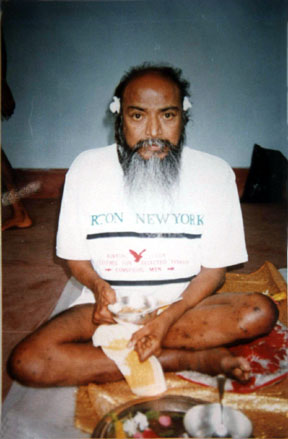![]()
HOME │ HIS LIFE │ MEDITATION │ PROGRAMS │ BHAVA │ EXPERIENCES │ YOGA VASISHTA │ BOOKSTORE │ PHOTOS│ VIDEO │ LIBRARY │ ARCHIVES
INDEX page │ PREVIOUS page │ NEXT page

“The disciple has to follow the instructions of the guru. At the same time, the guru also should behave according to the desire of the disciple. Only then they both can go together. They can both be peaceful and happy.”
“Swamiji did not do as he wished. Whatever his guru said, he did that. He did not do anything for his own benefit. Swamiji trusted his guru and did not want to ask any questions.”
“Whenever Swamiji wishes to see his guru, he appears in front of Swamiji. The way Lord Shiva appeared the very first time, that is the same physical form in which he appears to give Swamiji direction. Swamiji keeps following the directions given by his guru. He follows the directions very exactly. If his guru tells him not to go to a certain place, he does not go there. He goes somewhere only at the direction of his guru. His guru made him do tapas for doing service to the public, so he follows whatever directions his guru gives. The guru orders him depending upon the conditions of the world.”
“Swami does service for the people only with the direction of his guru. Swamiji asks his guru about whatever he has to do. Swamiji does whatever his guru tells him. Swamiji is following his guru’s orders. He will follow his guru’s word until the end of his life.”
“Swamiji listens to the words of his guru, but if Swamiji tells you something and you want to question why, you can ask him. It depends upon your interests. If you still have any doubt, you ask him. He will explain it to you.”
![]()
How does one reconcile self-reliance with obedience? Shivabalayogi encouraged devotees to experience and think for themselves, and he also insisted upon the need for the guru's guidance. Sometimes he gave very specific instructions. Sometimes he invited suggestions and decisions based upon a consensus with devotees. Sometimes he would express anger when a devotee would not listen, and some of those times he explained that his anger was intended to keep the devotee from unnecessary trouble. But generally, he did not expect devotees' obedience, nor was obedience anything he stressed as a rule.
The exception may be tapas. Shivabalayogi himself set an example because he did not question his guru, and he did not ask for any boon. When devotees asked for his initiation into tapas, Shivabalayogi expected similar selflessness.
Swamiji's example and comments suggest one reconciliation. The more one develops spiritual awareness and powers, the more obedience to the guru is required. There are plenty of examples of spiritual leaders who acquired great spiritual powers, but either misused them or led less than exemplary personal lives. But for the rest of us, Shivabalayogi encouraged us to know for ourselves. He would even tell devotees not to trust Shivabalayogi's experience. We should know for ourselves. If we have doubts or questions, express them and he will answer them.
INDEX page │ PREVIOUS page │ NEXT page
 |
Divine Play: Shivabalayogi’s life and blessings, 290 pages and over a hundred photos. Generally available in bookstores and online. |
Swamiji’s Treasure: The most comprehensive collection of biography, experiences, conversations & photographs of Shivabalayogi. |
Tapas Shakti: Published at Swamiji’s request in India, January of 1992. Contains his biography, conversations & experiences. |